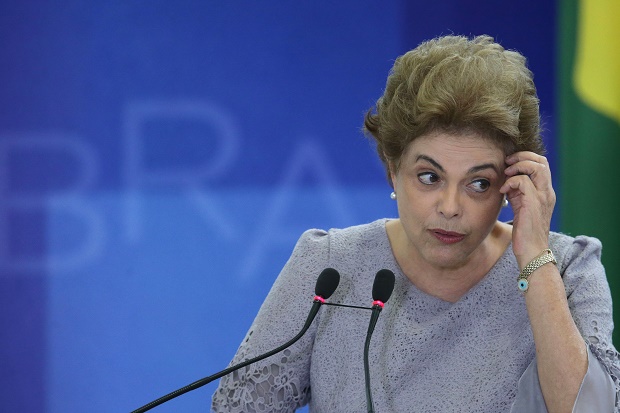
Brazils President Dilma Rousseff speaks during a meeting of pro-government lawyers at the Planalto Presidential palace, in Brasilia, Brazil, Tuesday, March 22, 2016. Brazilian Supreme Court justice Rosa Weber, denied a request by lawyers to overturn a decision last week that blocked former Brazilian President Luiz Inacio Lula da Silva from becoming chief of staff to President Rousseff. Lula da Silva in has been tied to a sprawling corruption investigation involving Petrobras, the Brazilian national oil company. AP Photo
BRASÍLIA, Brazil—Brazilian President Dilma Rousseff said Tuesday she had committed no crime and would never resign despite corruption allegations, as the scandal threatening her government escalated with dozens of new arrests.
In a defiant speech from the presidential palace, the leftist leader accused her opponents of seeking to stage a “coup against democracy,” with impeachment proceedings and mass protests calling for her ouster.
READ: Brazil president faces angry citizens as elections loom
“I will never resign,” she told a cheering crowd of supporters. “Not under any circumstances.”
Rousseff’s presidency appears to be in peril as she fights impeachment, protests, recession and scandal.
And her decision to call her predecessor and mentor, Luiz Inacio Lula da Silva, to the rescue backfired last week when a Supreme Court judge blocked his appointment as her chief of staff over pending corruption charges.
Another Supreme Court judge refused Tuesday to rule on Lula’s request to overturn that decision.
But yet another high court judge requested that the anti-corruption investigation hand over Lula’s case, on grounds that it affects people who are under immunity, such as Rousseff.
The full Supreme Court is expected to issue a definitive ruling on Lula’s appointment—which comes with ministerial immunity—sometime after it reconvenes on March 30.
Lula, who presided over a booming Brazil from 2003 to 2011, faces money-laundering charges related to a multibillion-dollar corruption scandal centered on state oil company Petrobras that has unleashed a political crisis.
The scandal expanded yet again as federal police staged raids in nine states across the country to execute 43 arrest warrants or temporary detention orders.
The raids targeted construction giant Odebrecht, which investigators accuse of colluding with competitors to divvy up Petrobras contracts over the course of a decade, paying huge bribes and then inflating the contracts by even larger amounts.
Former chief executive Marcelo Odebrecht was sentenced to nearly 20 years in prison earlier this month, but prosecutors said he had shown the “audacity” to keep ordering bribe payments even after his detention.
Investigators said bribes of up to $2.5 million at a time were paid out at hotels, in cash.
More revelations to come
In an indication the scandal may spread further, investigators said one of the projects for which Odebrecht paid bribes was the Sao Paulo stadium that hosted the opening match of the 2014 World Cup.
Prosecutor Carlos dos Santos Lima said the investigation “is going to touch other areas besides the oil sector.”
“A lot of things are going to be discovered,” he told a press conference.
The crisis is threatening the “democratic stability” of Brazil, warned Alicia Barcena, the head of a UN panel for the region, the Economic Commission for Latin America and the Caribbean.
Investigators say the ruling Workers’ Party was directly involved in the corruption, which Petrobras estimates cost it more than $2 billion.
Dwindling support in Congress
Rousseff is accused of manipulating the government’s accounts to boost public spending and hide the magnitude of the recession.
Government lawyer Jose Eduardo Cardozo said the case amounts to a “pretext for impeachment.”
Senate speaker Renan Calheiros, a centrist seen as close to Rousseff, cautioned the congressional committee that it needed solid evidence.
“An impeachment that doesn’t specify the crime committed by the president of the republic has another name,” he said alluding to the pro-government camp’s cries of a “coup.”
Rousseff’s opponents meanwhile failed in a bid to expand the official impeachment accusation to include new allegations from a senator charged in the scandal that the president used dirty Petrobras money to fund her campaigns.
There are signs the opposition is preparing for a post-Rousseff future.
Opposition leader Aecio Neves, who narrowly lost the 2014 election to Rousseff, met Monday with Vice President Michel Temer, the next in line for the presidency.
“If an impeachment is approved, we’ll be ready to help draft an emergency plan” for a transitional government, said Neves, head of the center-right PSDB party.
Newspaper O Globo reported Tuesday that Rousseff’s camp now calculates the number of lawmakers in the lower house of Congress who are loyal to the president has fallen from about 250 two weeks ago to 172.
That is dangerously close to the minimum of 171 needed to block a two-thirds vote to open an impeachment trial.
Sixty-eight percent of Brazilians favor impeachment, according to pollsters.
The crisis has triggered huge, angry protests for and against the president, laying bare sharp divisions in the country of 200 million people, just months before it hosts the Olympics in Rio de Janeiro in August.